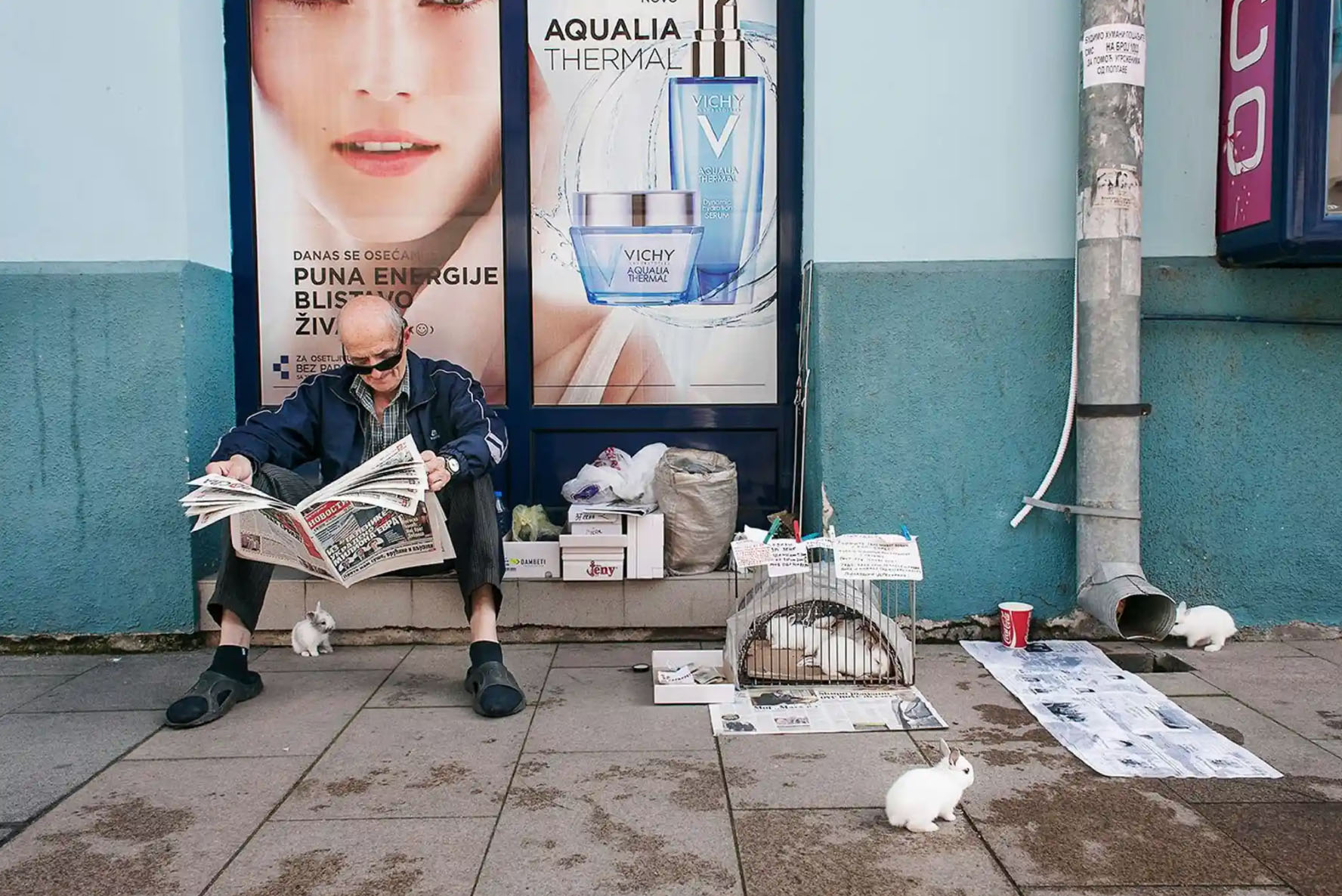Master Dissertation Studio
Visit. Prof. Anuschka Kutz
Campus Brussels
Engagement Urban Cultures
Academic year 2021-2022
Studio Urban Field Lab
Fragilities
Photo by Sebastian Steveniers, Rabbits, Sumadija, Serbia, 2014
The studio will run in a hybrid mode
operating 50/50 on campus / remotely,
alternating between both modes.
# Thematic Studio Framework
Studio Urban Field Lab will work with the thematic framework of Fragilities. We will work with diverse fragilities situated in different contexts, including societal and economic fragilities, such as urban and rural inequality, political, religious, ethnic, cultural or gendered fragilities, such as displacement or expulsion, and environmental fragilities. Fragilities rarely derive from singular factors or come in neatly objectifiable entities, instead they are mostly entwined in complex multi-scalar forcefields characterized through a simultaneous acting of social, cultural, economic, environmental, political and spatial factors that criss-cross and interlace global, national, regional, interest-based, personal, institutional and intimate scales and territories, linking the personal and individual to the societal. Fragilities manifest in diverse scales, from the scale of a room in a domestic or institutional setting to the scale of a region, nation to the global scale; often we deal with an interlacing of multiple scales. We will not tackle fragilities as abstractions, but we will work on concrete case studies that bring Fragilities ‘to the ground’, to real spaces and actual people. What can we architects bring to the table to enhance opportunities, mediate, infuse and mitigate?
# Project context
The Master studio with its global studentship offers a unique – but often underutilised – opportunity to collectively build capacities that outstrip our individual knowledge base, perspective and experience. By inviting you to set your own project context and focus within the set framework of Fragilities, we integrate your diverse backgrounds, lived experience and embodied expertise into the studio context. This will deepen our collective understanding of fragilities in a global context and permit us to explore differences and similarities across diverse projects. You can select a case and context located in your own cultural and spatial background, or work in a Brussels or Belgium-based context. For those who do not wish to set their own project context, a project context in London or the South-East of England will be offered, for which you will pronounce your own focus. The setting of your project premise will happen in term 1. Students should select a context that they are able to travel to (preferably between November 2021 and February 2022).
# Methodology
We will share a methodology, rather than a site. We will work in an investigative and multi-scaler manner, relating diverse scales from the remote to the close-up, the global, national, regional, city-wide, localized, inhabited, but also the personal, intimate, close-up scale, linking everyday life experiences of people and their environments, to wider urban systems. Ethnographic tools will help us to engage with lived space. You will need to challenge known ways of working and embrace diverse and unfamiliar methodologies and knowledge fields across disciplines, such as, ethnography, economy, politics, urban geography, health, environmental studies, sociology and art. The studio is research driven throughout, including the design process.
# Studio Ethos
Studio Urban Field Lab deals with real-world societal, political, economic and cultural transformations for which alternative spatial responses are sought. The studio sees itself as an advocate of our obligations towards the environment, the lifeworld, humanity and society. Given that the UN has just pronounced a ‘code red for humanity’ this becomes an urgent responsibility for us. We need to develop creative ways beyond technical solution to redistribute, to harness dormant opportunities, to tackle spatial surpluses, to edit, alter and shift, without conceding quality. We need to reconsider and widen our role and practice field as architects, engage in interdisciplinary work modes to tackle isolationist disciplinary responses, whilst at the same time showing the immense capabilities that our disciplinary field brings to the table. Your projects will need to integrate a clear stance and commitment towards these issues by acting with conscience and care. We investigate and develop through critical practice and in-depth enquiry. This will lead us to coherent, comprehensive and ambitious strategic urban and spatial responses.
# Deliverables
Although there will be deliverables, you will need to work beyond ‘final outputs’, committing to an in-depth, rigorous and critical ongoing research-driven process throughout. Stradling into other disciplines is encouraged. The recommended final output is a combination of a comprehensive, in-depth and detailed design-driven work (project-based work) and critically astute theoretical work (reflection paper). There is scope to individually scale the intensity you wish to bring to the written, or project-based domain. Deliverables will be agreed once your project stance is clear.
# Studio Culture
The studio will unfold in interaction with your projects. The studio will act as a supportive debate platform and workshop. Collective activities and peer debates will be as important as more tailored project discussions with your promotor. You will need to work on your project in a self-directed manner. The studio will be of a hybridnature, operating 50/50 in-situ in Brussels / remotely, alternating between both modes. We will meet on a weekly basis using on-site as well as remote facilities. This dual mode will permit us to integrate diverse online tools, such as Miro which we will use to generate an on-going digital archive of your developing work. At the same time, we will use on-site sessions to engage in person and to produce hands-on work in situ. Invited guests will infuse our work. The studio language is English.
Any questions, please email: Anuschka Kutz
See previous work here https://www.blog-archkuleuven.be/urban-field-lab/
Course assignment (pdf)

